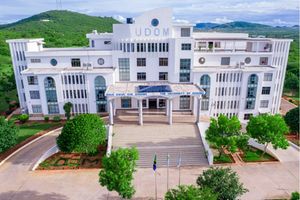Tanzania Commission for Universities take varsities on over diplomas

TCU’s executive secretary Prof Charles Kihampa
Dar es Salaam. No university in Tanzania will now be allowed to offer diploma or certificate courses that can be offered by mid-level academic institutions such as polytechnics, according to new guidelines by the Tanzania Commission for Universities (TCU).
TCU released its latest (December 2019) Handbook for Standards and Guidelines for University Education, requiring universities to differentiate themselves from middle level institutions.
The commission believes the number of mid-level institutions has increased to an extent of being able to accommodate students seeking to pursue certificates and diplomas, without necessarily having to obtain them from universities.
TCU’s executive secretary Prof Charles Kihampa said a university is required to have the combined proportion of the diploma or certificate programmes not exceeding 30 per cent of all academic programmes.
“A university may offer a degree, diploma or certificate but such programme shall not be that being offered in a regular middle level institution operating in Tanzania and shall cater for professional development,” he said.
Prof Kihampa further disclosed to The Citizen that the minimum number of programmes for a newly established University to be allowed to operate in Tanzania shall be one accredited degree programme.
“For a newly established university, it shall focus on specific areas/fields of concentration certified by the Commission during the establishment and initial accreditation,”Prof Kihampa said.
The Commission’s secretary said the new procedures aims at improving the quality of programmes offered by higher learning institutions operating in the country.
“This is as result of a critical analysis by the Commission and other stakeholders. We are sure that these guidelines are significant in raising our universities’ quality levels,” he said.
He noted that it is time for universities in Tanzania to be recognised by the quality of the programmes they offer, and distinguished from middle level institutions offering the same programme.
“We want our institutions to concentrate on a certain area/field as certified by the commission unless there is a new development which will also need our approval,” he said.
Stakeholders’ response
Dar es Salaam-based educational consultant, and former lecturer, Mzumbe University, Dr Tumaini Mwakipesile, commended TCU for defining what each institution should be doing as far as quality assurance was concerned.
“This is a great move. We can’t have our ‘big’ universities offering programmes that can be offered by mid-level institutions.
The mid-level institutions have been producing skilled graduates with diplomas demanded by the labour market than those diploma graduates from universities,” he said.
He said that universities should concentrate on improving the quality of the bachelors, masters and PhDs they are known for and let the mid-level institutions, capable of producing quality specialised graduates do so.
“When it comes to global rankings, the quality of certificates and diplomas do not determine the position of a university. Simply because that is not what universities are meant to do,” he said, adding: “Some universities are doing it out of money and not professional quality.”
Dr Charles Kitima, former Vice Chancellor at St Augustine University of Tanzania (Saut), said worldwide certificates and diplomas were not the priority for universities.
He said for many years, Tanzania lacked enough middle-level colleges to accommodate students who failed to join universities and wanted to specialise on a certain area.
“Shortage of these institutions prompted universities to start programmes to accommodate certificate and diploma students,” he said.
“If the institutions are currently enough to accommodate students who fail to join universities, I see no problem because that is how it’s supposed to be,” he said.
Dr Kitima, who is also the secretary general of Tanzania Episcopal Conference (TEC), further said that in the last five years TCU lagged behind and it was ‘confusing’.
H said many Tanzanian students opted to enrol for studies abroad including undergraduate degrees which could be obtained locally.
“There were confusions caused by the commission’s poor leadership. The new leadership now is focused and promising,” Dr Kitima said.





